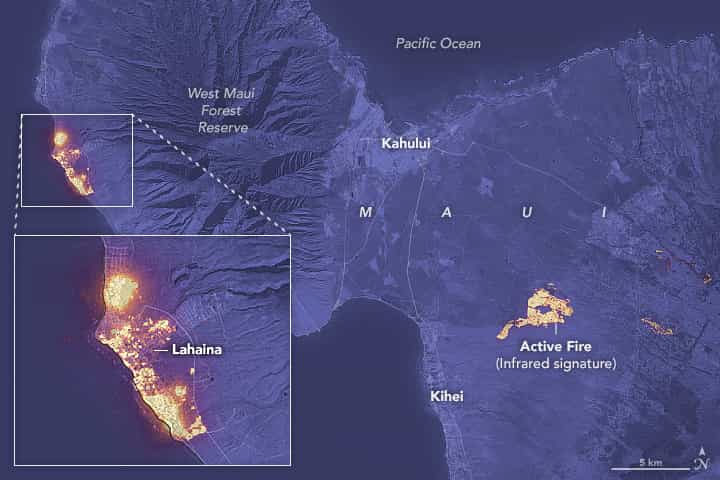
A fast-moving wildfire has devastated the historic town of Lahaina on Maui, Hawaii’s second-largest island. 55 people have died, officials confirmed Thursday, with that number expected to surpass 60, making the disaster the deadliest since Hawaii became a state in 1959, Gov. Josh Green said.
The image above shows the signature of the fire at 10:25 p.m. local time on August 8, 2023, as observed by the Operational Land Imager (OLI) on the Landsat 8 satellite. Much of Lahaina, a town with a resident population of nearly 13,000 people, appeared to be on fire at the time of the image. Another large fire burned northwest of Kihei.
The image was composed from OLI observations of shortwave infrared light (band 6). Infrared observations are useful for distinguishing the locations of active fires, shown here in yellow. The shortwave infrared data were overlaid on a natural-color mosaic image based on Landsat 8 observations for added geographic detail.
The fires occurred during a period of strong winds and dry conditions in Maui. Between August 7-9, 2023, the island experienced peak gusts that ranged from 45 to 67 miles (72 to 107 kilometers) per hour, according to the National Weather Service. The presence of a strong high-pressure area to the north of the island and Hurricane Dora to the south may have helped fuel the winds. An analysis by the U.S. Drought Monitor shows that the southwestern part of the island was in the midst of moderate to severe drought at the time of the fires.
Maui County has reported damage to hundreds of structures, with widespread damage in the Lahaina harbor area. On August 9, authorities were continuing to conduct search and rescue operations.
NASA’s Earth Applied Sciences Disasters program area has been activated in support of the fires in Hawaii. As new information becomes available, the team will be posting maps and data products on its open-access mapping portal.
This post first appeared on NASA Earth Observatory. NASA Earth Observatory image by Lauren Dauphin, using Landsat data from the U.S. Geological Survey. Story by Adam Voiland.